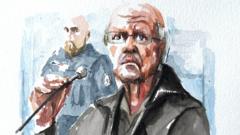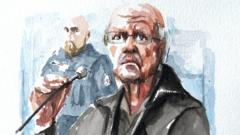Survivors of surgeon Joel Le Scouarnec are appalled that his 20-year prison sentence doesn’t include preventive detention, raising concerns over his potential release in the 2030s.
Sentencing Outrage: Victims React to Paedophile Surgeon’s 20-Year Term

Sentencing Outrage: Victims React to Paedophile Surgeon’s 20-Year Term
French victims express discontent over lenient ruling for notorious paedophile surgeon Joel Le Scouarnec.
The courtroom in Vannes reverberated with despair on Wednesday as victims of notorious paedophile surgeon Joel Le Scouarnec voiced their outrage over a 20-year prison sentence that lacks preventive detention. At 74, Le Scouarnec was convicted of sexually abusing hundreds, primarily underage patients, leading to his admission of 111 rapes and 188 sexual assaults during the trial. The ruling, which allows sentencing to account for his age and a perceived desire to repent, means that despite the maximum sentence, the possibility of his release in the early 2030s remains.
Survivors and advocates have criticized the decision, with one victim lamenting the disparity in sentencing severity between sexual crimes against children compared to other offenses. Child advocacy group leader Solène Podevin Favre described the judgment as “staggering,” highlighting that the maximum sentence felt insufficient given the scale of the abuses. Critics argue that France's legal system must evolve to impose harsher penalties for serial offenses, as highlighted by the recurring theme in similar cases.
Victims have called for legislative reforms after experiencing perceived leniency in the justice system. The presiding judge, Aude Burési, acknowledged the plaintiffs’ fervent wishes for never-ending incarceration but stated that denial of release does not align with the principles of law. Victims and their families expressed their fears in the aftermath of the ruling, pressing for measures to ensure Le Scouarnec cannot offend again—a notion amplified by the emotional outcry of parents and advocates alike.
“The man should be kept away from society forever, as long as necessary to protect others,” voiced one mother of a victim, emphasizing the need for a reevaluation of the legal framework surrounding such serious crimes. The broader implications of Le Scouarnec’s case continue to resonate, sparking urgent discussions about how the justice system can better protect the most vulnerable.




















